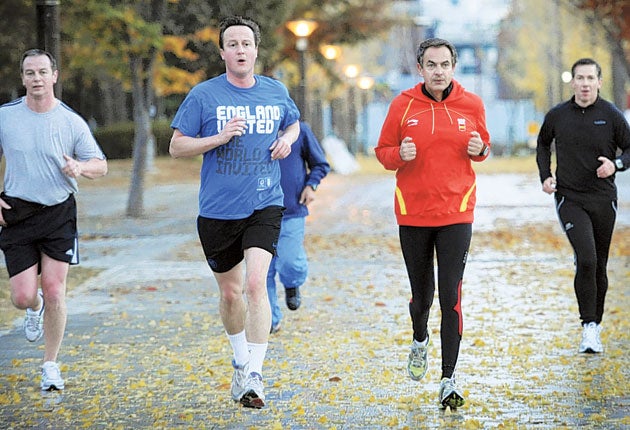A summit high on rhetoric, low on achievement
The world's economic powers are as divided as ever, says Sean O'Grady

Look closely at the Group of 20 photo and you will notice that it is in fact a group of 33 individuals being urged by the South Korean President Lee Myung-bak to smile and wave at the camera.
Slightly larger, then, than the legal limit for British infant classes, and just as difficult to chair, co-ordinate and guide to sensible conclusions.
David Cameron forgot to wave; Cristina Fernandez de Kirchner, President of Argentina, forgot to smile. Too many leaders forgot what they were there for. Rarely in the long and often inglorious history of international economic diplomacy has so little been achieved by so many.
On the crucial question of restraining the "currency wars" that have already broken out, the final communiqué offered only the most insipid of promises, committing nations to move "toward more market-determined exchange-rate systems, enhancing exchange-rate flexibility to reflect economic fundamentals, and refraining from competitive devaluation."
On policing each others' policies – one of the few valuable innovations of the G20, launched at the Pittsburgh meeting last year – the IMF's verdict is that "progress is being made, but important policy challenges remain". Translated: everyone knows they have something to hide and there is a conspiracy of silence. The G20 warns that "unco-ordinated policy actions will only lead to worse outcomes for all". To which the unfortunate response must be: "Too late, guys."
The big economic event that immediately preceded the G20 get-together was the US Federal Reserve's unilateral announcement that it will pump an additional $600bn (£372m) into the American economy. The effect was to depress the dollar and boost the yen, yuan, euro, pound and the rest. The desired effect, in other words. The former Fed Chair Alan Greenspan described it as "a policy of currency weakening".
Less prosaically, it was a US declaration of economic war; if China will not voluntarily allow her currency to reach what the G20 terms a more "market-oriented" level, as she has consistently failed to, then the Americans will do it for them by printing dollars.
For America, using the currency as a weapon works because the supply of ammunition – more dollars – is virtually inexhaustible. The Chinese may try to buy more dollars to drive the exchange rate back up again, but that has limits. Even if the Chinese added, say, another trillion dollars to the $2trn-worth of US Treasury paper they presently own, that could all be devalued by the Fed. Hence the occasional talk from Chinese officials about replacing the dollar as a reserve currency with some cocktail of the euro, yen, yuan and gold (at least before the near-disintegration of the European single currency earlier this year). The more realistic danger is that the Chinese opt to retaliate with more protectionist measures and the Americans follow suit. Both sides in this "G2" have already begun to indulge in such behaviour – American fiscal packages have a "Buy American" rule – and it remains to be seen how the new Congress will behave when it assembles next year and US unemployment stays stubbornly high. Congress won't be much influenced by what the G20 thinks, even when the more assertive French take over the chair next year.
Nations responsible for reserve currencies, the G20 says, should be "vigilant against excess volatility and disorderly movements in exchange rates". But, as we see, by far the most important reserve currency in the world, the US dollar, is happily displaying plenty of scope for disorderly movements.
Nor should the British be too smug about any of this. While no one was looking a couple of years ago, the Bank of England stealthily oversaw a substantial collapse in the value of sterling – 25 per cent down since 2007, larger than the more famous 1949, 1967, 1976 and 1992 slides. We got our move in early.
Remember, too, that the big difference between the UK and Ireland is that we have our own currency and that added flexibility to adjust to an economic shock.
This G20 did produce some goods: reform of the IMF to give China, India and Brazil more say; and endorsement of the new rules on the largest banks. Yet these technical, incremental reforms probably didn't require Barack Obama, Angela Merkel and Hu Jintao to fly thousands of miles to rubber-stamp them.
The G20 has too many people around the table (including in this case the Presidents of Malawi and Singapore, and the chairman of the Financial Stability Board) who are too jet-lagged and insufficiently motivated to reach accord. Quietly, and understandably, many of them, including the British, are moving towards more bilateral talks – such as the recent Cameron-led missions to India and China.
Not since the London G20 summit in April last year has the G20 acted together, and that was only because they were staring down the double-barrelled shotgun of a global financial collapse and a 1930s-style slump. Gordon Brown's statesmanship – his finest hour indeed – helped, but the main driver was the rare coincidence of national interests. Without that, there are only smiles.
Subscribe to Independent Premium to bookmark this article
Want to bookmark your favourite articles and stories to read or reference later? Start your Independent Premium subscription today.

Join our commenting forum
Join thought-provoking conversations, follow other Independent readers and see their replies